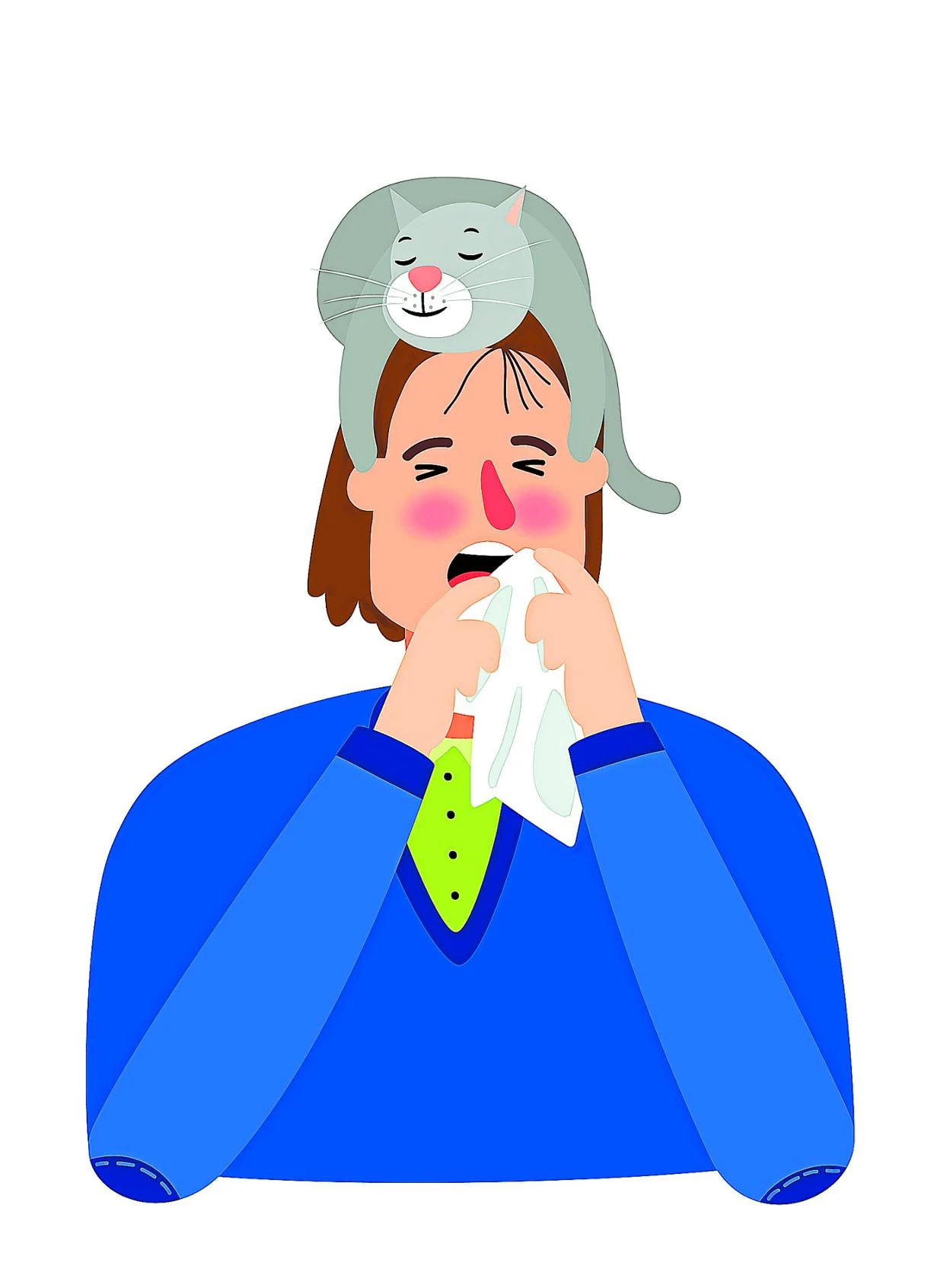

Sections
Highlight

ISAAC ASENJO
Friday, 23 September 2022, 12:07
Sneezing, runny nose, itchy eyes and throat, maybe even difficulty breathing. It happens all year round and is worse when I'm at home...especially when I'm near my cat. I didn't use to notice it so much but over the past few months it has become worse. What should I do?
Well, if this applies to you, the first thing you need to do is: make an appointment to see an allergy specialist.
About nine per cent of adults in Europe are sensitised to animal hair and fur and the figure increases to 27 per cent if the person suffers from some type of respiratory allergy according to a book on allergic illnesses written by the Spanish Allergology and Clinical Immunology Society and published by the BBVA Foundation.
"Contrary to what most people think, the fur itself is not the cause of the allergy. It is caused by proteins found in the saliva, urine and flakes of the animal's skin which disperse into the atmosphere. These are responsible for symptoms such as rhinoconjunctivitis, asthma, rashes and even anaphylaxis," Manuel De Las Heras Gonzalo, an allergy specialist at the Jiménez Díaz Foundation explains.
So could hypoallergenic breeds be the answer for someone suffering from this problem?
"That is a commercial myth more than anything else because to create breeds like that we would have to resort to genetic engineering to eliminate the protein that causes the allergy from the animal's DNA," says Nacho Sierra, a psychologist who specialises in animal behaviour. However, as a guideline, he says that "animals with short hair have fewer elements for the protein to travel in a volatile way, just like those with woolly or curly hair like water dogs. With those types, the possibility of an allergic reaction is reduced".
Dogs and cats, the most habitual domestic pets in households - there are five million dogs and three million cats in Spanish homes - are a common cause of respiratory allergic illness, and it is something which appears to be increasing all over the world.
"Obviously, the more pets there are in a home - 40 per cent households in Spain have one - the greater the exposure to them and therefore the higher the probability of developing an allergy," explains Manuel Lázaro of the College of Veterinary Surgeons in Madrid.
He also points out, however, that a review of recently published articles suggests that early exposure to cats and dogs is likely to protect against developing an allergy to them later in life.
How is an allergy to household pets diagnosed by a specialist?
"The same way as with other types of allergy; there are different methods such as skin tests or determining the IgE antibodies in the patient's blood compared with the allergens of the animals who could be causing the problem," says Álvaro Amo Vázquez de la Torre, an allergy specialist at the Clínica Amo Salud and member of Top Doctors.
"If it turns out that I am allergic to my pet, do I have to get rid of it?"
Well, the most effective option is not to have an animal, obviously, but if you want to keep it - bearing in mind the emotional factor involved - strict hygiene measures should be taken such as giving the pet regular baths, not letting it sleep in your bedroom, or installing air purifiers with Hepa filters, Vázquez de la Torre recommends.
"You could also have an anti-allergy vaccination. These last for three to five years and what they do is teach the immune system that the allergen in the animals is not harmful, so it does not provoke an allergic response (which would be an erroneous response)," he says.
This specialist does not recommend changing to a different type of pet, because if someone is sensitised to one species it is quite likely that they will end up sensitised to others as well.
"Although there would be no problem with changing to reptiles, amphibians or fishes," he says.
Immunotherapy with animal allergens should be considered for allergic people where exposure to animals is inevitable.
Topical products can also be a solution - those applied to surfaces of the body - for pets. "By reducing skin flaking and compacting it to stop it becoming so volatile, they can be a lot of help in avoiding allergens," Manuel Lázaro says.
There are 22 million pets in Spain. Apart from dogs and cats, do other animals cause allergies?
"Yes, there are allergies to birds which can cause respiratory problems and, to a lesser extent, to amphibians or reptiles like iguanas and lizards, but those cases are more exceptional," says Vázquez de la Torre.
Rodents and horses can be a problem too, in some cases, as Manuel Lázaro points out.
Publicidad
Publicidad
Publicidad
Publicidad
Esta funcionalidad es exclusiva para registrados.
Reporta un error en esta noticia

Debido a un error no hemos podido dar de alta tu suscripción.
Por favor, ponte en contacto con Atención al Cliente.

¡Bienvenido a SURINENGLISH!

Tu suscripción con Google se ha realizado correctamente, pero ya tenías otra suscripción activa en SURINENGLISH.
Déjanos tus datos y nos pondremos en contacto contigo para analizar tu caso

¡Tu suscripción con Google se ha realizado correctamente!
La compra se ha asociado al siguiente email
Comentar es una ventaja exclusiva para registrados
¿Ya eres registrado?
Inicia sesiónNecesitas ser suscriptor para poder votar.